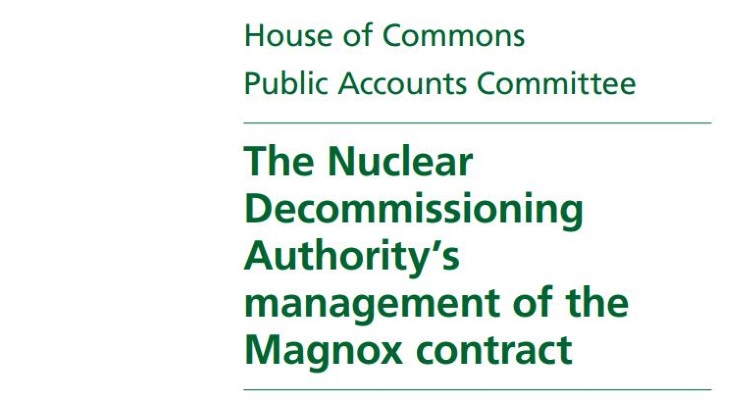In its report, The Nuclear Decommissioning Authority’s management of the Magnox contract, the committee says uncertainty affecting the Magnox sites "reflects a wider uncertainty" about the costs and timetable of decommissioning the whole civil nuclear estate.
"The NDA acknowledges that it does not have full understanding of the condition of the 17 sites across its estate, including the 10 former Magnox power stations. Consequently, there is significant uncertainty about how long decommissioning will take and how much it will cost," the PAC said. "The NDA considers that it now has its best estimates yet of the cost and timetable for taking the Magnox sites to the 'care and maintenance' stage of the decommissioning process, but the latest estimates cover a very broad range of outcomes."
The NDA now estimates that this will cost between GBP6.9 billion and GBP8.7 billion, which is GBP1.3- 3.1 billion more than its previous estimate made in 2017, and will take between 12 and 15 years for the Magnox sites to reach the care and maintenance stage.
"According to the NDA's most recent estimates it will cost the UK taxpayer GBP132 billion (USD176 billion) to decommission the UK's civil nuclear sites and the NDA estimates that the work will not be completed for another 120 years," the committee said. "The largest proportion of this cost is to clean up and decommission the NDA's largest site at Sellafield, but the cost to decommission the NDA's Magnox sites is also substantial, as is the liability associated with decommissioning the next family of nuclear power stations, known as the Advanced Gas-Cooled Reactors (AGRs)."
The money held in the Nuclear Liabilities Fund, which exists to fund the decommissioning of the AGRs specifically, was increased from GBP9.5 billion by an additional GBP5.07 billion this year to reflect the latest estimate of the work required.
The NDA and the Department for Business, Energy & Industrial Strategy (BEIS) should make it a priority, the committe said, to progress their plans to find a location for a geological disposal facility in order to reduce interim storage costs at Sellafield and elsewhere, and should confirm when they consider such a facility might feasibly become available for the storage of waste.
A shortage of the right skills within the NDA and across the nuclear industry remains a significant barrier to progress. Within six months of publication of this report, BEIS and the NDA should publish a detailed plan for how they plan to meet the demand for skills across the UK nuclear industry over the next five to 10 years, the committee said.
The NDA should develop a strategy for maximising the economic benefits of developing and, where appropriate, "exporting its knowledge and assets to alleviate the burden on the taxpayer". These include the skills and experience of the UK nuclear industry, the decommissioning technologies it has developed, and the land and other physical assets the NDA holds.
The NDA should be more transparent about its current and future plans with the local communities surrounding its sites to strengthen public accountability and make clear the socioeconomic impact of its planned activities, the committee said.





_47120.jpg)
_23621.jpg)

_63865.jpg)





